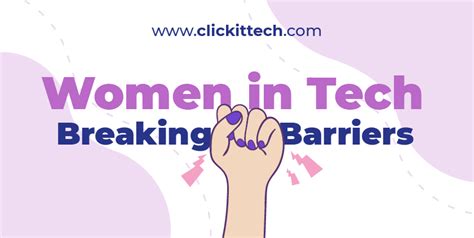Women have made significant contributions to the world of technology, from pioneering computer programmers to innovative entrepreneurs. Despite facing numerous challenges and biases, women in tech have persevered and achieved remarkable success. In this article, we will celebrate the achievements of women in tech, explore the barriers they face, and discuss ways to promote greater diversity and inclusion in the industry.
The History of Women in Tech

The history of women in tech dates back to the early 19th century, when Ada Lovelace, often considered the first computer programmer, wrote the first algorithm intended to be processed by a machine. In the 20th century, women like Grace Hopper, Hedy Lamarr, and Katherine Johnson made groundbreaking contributions to computer science, engineering, and mathematics.
Pioneering Women in Tech
- Ada Lovelace: Known as the first computer programmer, Lovelace is famous for her work on Charles Babbage's Analytical Engine.
- Grace Hopper: A pioneering computer scientist and Navy Rear Admiral, Hopper developed the first compiler and was a key figure in the development of the COBOL programming language.
- Hedy Lamarr: A Hollywood actress and inventor, Lamarr developed a frequency-hopping system for torpedo guidance during World War II, which later became the basis for modern spread-spectrum communication technologies like Wi-Fi and Bluetooth.
Barriers to Women in Tech
Despite their achievements, women in tech face numerous barriers, including:

- Bias and Stereotypes: Women are often subject to biases and stereotypes that discourage them from pursuing careers in tech.
- Lack of Representation: Women are underrepresented in tech leadership positions, making it harder for them to find role models and mentors.
- Unequal Pay: Women in tech often face pay disparities compared to their male counterparts.
- Harassment and Bullying: Women in tech may experience harassment and bullying, both online and offline.
Consequences of Barriers
The consequences of these barriers are far-reaching, resulting in:
- Limited Diversity: The lack of women in tech limits the diversity of perspectives and ideas, leading to less innovative solutions.
- Brain Drain: Women who face barriers may choose to leave the tech industry, resulting in a loss of talent and expertise.
- Negative Impact on Society: The underrepresentation of women in tech can perpetuate existing social inequalities and limit the potential for technology to benefit society as a whole.
Breaking Barriers: Strategies for Promoting Diversity and Inclusion
To break down the barriers facing women in tech, we need to implement strategies that promote diversity and inclusion:

- Mentorship Programs: Establish mentorship programs that pair women in tech with experienced mentors who can provide guidance and support.
- Diversity and Inclusion Training: Provide training programs that educate tech professionals about bias, stereotypes, and the importance of diversity and inclusion.
- Flexible Work Arrangements: Offer flexible work arrangements that allow women to balance work and family responsibilities.
- Scholarships and Grants: Offer scholarships and grants to support women pursuing careers in tech.
Success Stories: Women in Tech Who Have Broken Barriers
- Reshma Saujani: Founder of Girls Who Code, a non-profit organization that aims to increase the number of women in technology.
- Sheryl Sandberg: COO of Facebook and founder of Leanin.org, a platform that aims to empower women to achieve their goals.
- Fei-Fei Li: Director of the Stanford Artificial Intelligence Lab (SAIL) and co-founder of AI4ALL, a non-profit organization that aims to increase diversity and inclusion in AI.






Conclusion
Women in tech have made significant contributions to the industry, despite facing numerous barriers and biases. To promote greater diversity and inclusion, we need to implement strategies that support women in tech, including mentorship programs, diversity and inclusion training, flexible work arrangements, and scholarships and grants. By celebrating the achievements of women in tech and working to break down the barriers they face, we can create a more inclusive and innovative industry that benefits society as a whole.
What are some common barriers faced by women in tech?
+Women in tech face numerous barriers, including bias and stereotypes, lack of representation, unequal pay, and harassment and bullying.
How can we promote diversity and inclusion in tech?
+We can promote diversity and inclusion in tech by implementing strategies such as mentorship programs, diversity and inclusion training, flexible work arrangements, and scholarships and grants.
What are some success stories of women in tech who have broken barriers?
+Some success stories of women in tech who have broken barriers include Reshma Saujani, Sheryl Sandberg, and Fei-Fei Li.
